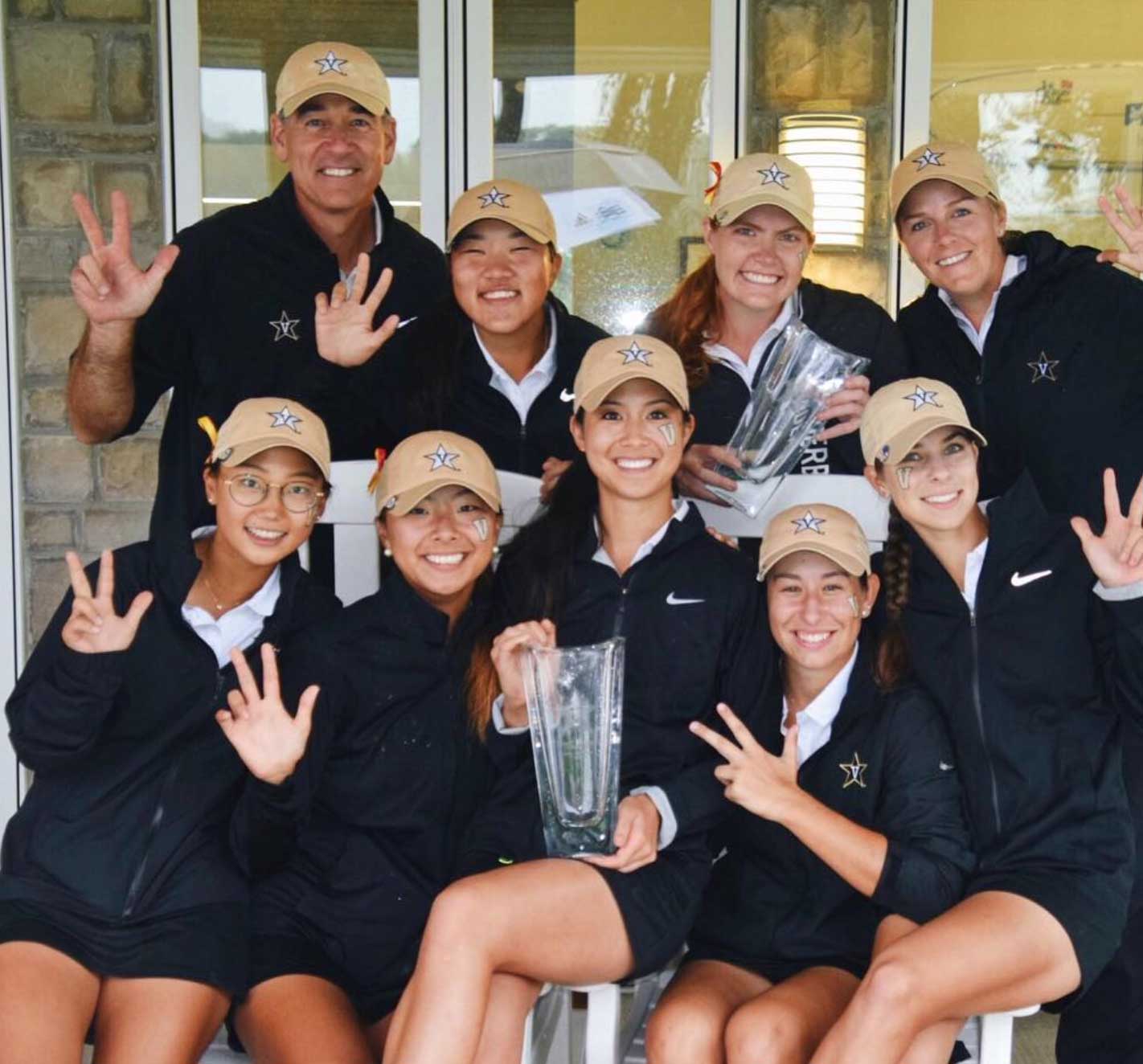Jon Rahm rode eight birdies to the top of the leaderboard at 8 under at LIV United Kingdom on Friday, surging to the front of the pack after Bubba Watson tumbled through consecutive par-4s in 12 shots.
Want to play college golf? Follow these 5 proven recruitment tactics

Whether you’ve already committed to the recruiting process or are on the fence, these tactics will maximize your chances of landing an offer.
The post Want to play college golf? Follow these 5 proven recruitment tactics appeared first on Golf.
Whether you’ve already committed to the recruiting process or are on the fence, these tactics will maximize your chances of landing an offer.
The post Want to play college golf? Follow these 5 proven recruitment tactics appeared first on Golf.
College athletics can enhance the trajectory of your life, opening doors you never knew existed. From my own experience as a Division I golfer at Vanderbilt, competing at such a high level gave me the opportunity to leave my hometown of Windermere, Fla., surround myself with high-achievers and access an influential platform by which to chase my dreams.
Playing for the Commodores was the ultimate test, and reward. It forced me to break out of my shell and face more than I thought was possible. Although staying in my bubble was my comfort zone, I quickly realized I couldn’t do this alone if I wanted to be successful on and off the course. This meant learning to leverage my academic resources, building relationships with my professors and classmates, and prioritizing my own health and wellbeing.
I was challenged to constantly think outside the box and to adopt a problem-solving mindset. How could I balance schoolwork, practice, tournament travel, social activities, and sleep? How could I make adjustments in my environment and routine to optimize efficiency? How could I ensure I was communicating my schedule demands effectively with my professors? How could I be an accountable teammate and good friend? How could I prioritize my own purpose so that I could better lead others?

These questions allowed me to look deep within myself when things got tough, leading me to learn lessons and develop mental tenacity. Now, I want to help college-golf hopefuls benefit from the same experience I had, and that starts with finding the right school that will allow you to flourish both as a student and an athlete.
The recruiting process can sometimes feel like an unsolvable puzzle with a million pieces to assemble at the right time. What information do you need to set a solid foundation? How can you differentiate yourself from the competition? Sure, you may have researched recruiting dates and signed up for tournaments, but there are other steps you can take to put yourself in the best position to catch a coach’s eye. Here are 5 tactics that will help you maximize your chances of getting that offer.
1. What’s your ‘why’?
This is the million-dollar question you must ask yourself before embarking on any journey. It’s also a question college coaches are guaranteed to ask you on phone calls and visits: “Why do you want to play college golf?” An SEC coach told me that the best players ask and answer three key questions: How am I going to achieve “x”, what do I need to achieve “x” and why do I want to achieve “x.” Players with a strong sense of WHY are more efficient and effective in everything they do.
Your “why” is also important because it comes from within and will compel you to do the work even when you lose motivation — or when progressing requires pain in the short-term. Your why will keep you driven to pursue the work because it aligns with your purpose regardless of what you sacrifice in the moment. Your why is the uniqueness that sets you apart from everyone else.
Not only does your “why” inspire you to take action but it’s also what inspires others to take action. Here’s how to find your personal “why”:
-Understand that everyone’s “why” is different. Motivators include academics, scholarships, the chance to play professional golf or simply having a deep love for the game.
-Make your why simple, clear and actionable.
-Consider how your why will help your teammates and others in your circle.
-Ask as many questions as possible: Why do I do “x”? Why is “x” important to me? Why do I value “this” over “that”?
2. Understand what college coaches value beyond stats and rankings
Your junior rankings and stats will always be a priority, but there are many other factors college coaches consider when recruiting players. From my personal experience, I wasn’t the top-ranked junior player going into the process. In fact, I was a late bloomer.
But instead of dwelling on the fact that I lacked experience and time compared to my competitors, I used it as fuel for everything I did. If I wanted to play college golf and be successful, I had no other choice. This mindset allowed me to win one of the first AJGA tournaments I competed in, giving me exemption into higher caliber events and invitationals around the country. My mindset set me apart with how I carried myself on and off the course, along with my leadership skills. This kind of cultural fit just so happened to be what Vanderbilt was looking for.
Coaches want to find someone who they can nurture and mold. I have several friends who played D1 golf who weren’t top-ranked juniors but excelled once they started competing at the collegiate level. Why? These were the most common themes found after studying these players:
-Calm mindset and attitude in high-pressure situations
-Ability to adapt/adjust quickly when something isn’t working
-Highly coachable
Luckily, these three behaviors are all within your control. Although golf is an individual sport in which you are responsible for your own score, I can’t stress enough the importance of being a team player and being able to take constructive feedback. Knowing which qualities your target schools value most is essential, because each college will have different expectations, time commitments and goals.
3. Do your homework and embody what it means to be a college golfer
What kind of athlete do you wish to become? What scores do players at your target school shoot, and from what yardages? How do they practice? How do they eat and train? How do they conduct their post-round analyses?
You’ll be at an advantage if you prime your external environment NOW to embody the habits of a successful college golfer. Researching and understanding what is expected of a college’s athletes will allow you to be more intentional in your own training. Scientists have found that our environments are largely what shape human behavior, regardless of motivation or talent levels.
What often can be misjudged as a lack of motivation or discipline actually is just the result of a poor environment. The adage “winners often win because their environment makes winning easier” is important to remember as you aim to set yourself apart early on.
Although I entered the recruiting process late, I was able to shave years off my learning curve because I took notes on how college golfers behaved, practiced, exercised and even ate. Reach out to any current college golfers you know or AJGA staff, and do your homework. Our environments can drive both good and bad behavior. Athletes who have the discipline to stick to productive habits are often letting their environment work for and not against them.
A couple of helpful resources for tracking and following college golf scores include:
–Golfstat (college golf scores and stats)
–College Golf Guide (free membership when you sign up for the AJGA)
4. Understand recruiting timelines and prepare for tournament schedules ahead of time
As you’re working on crafting your junior tournament schedule, it’s important to know how coaches rank the different categories of tour organizations. Generally, this list is in ascending order of significance and caliber:
– Local/state/regional junior tours
– State golf associations (open to all amateurs)
– National junior tours (AJGA, IGJT, etc.)
– National invitationals (USGA championships, Junior World, etc.)
Each category has its own pros and cons. Smaller tournaments at the local level are a great way to help you build confidence and create momentum with wins, whereas national tournaments show coaches how you compete against the best players in the country. National events also tend to be held at tougher courses with longer setups. It’s important to find the right balance of tournaments that aligns with your ability, budget and goals. Several tours, particularly the AJGA, offer financial aid and scholarships.
I was at the ripe old age of 13 when I started playing competitively. My first tournaments were local tours around Orlando and wherever I would be allowed to enter. After two years of playing in Central Florida, I realized I needed to register for state tournaments if I wanted to take my game to the next level.
Time wasn’t on my side when, at 16, I started with the Florida Junior Tour hosted by the Florida State Golf Association, but I cannot say enough positive things about my experience. From the tournament hosts to the volunteers, the tour was extremely supportive and provided a plethora of resources to junior golfers. I mainly played throughout the state of Florida for a year, earning stars that gave me exemptions into AJGA events around the country. Although I was usually the player with the least competitive experience, the years spent grinding it out with the FJT and paying attention to what the best juniors were doing enabled me to win my third AJGA tournament I ever played in. This happened to be an Open event in Florida and a pivotal moment in my career because it gave me exemptions into the Rolex Junior Girls and various other national invitationals.
I also started playing USGA qualifiers and earned my way into the U.S. Girls’ Junior both years as well as the U.S. Women’s Amateur. I owe these pivotal moments to the various junior tours that work tirelessly to support junior golfers. This is a great link to Getting Started with the AJGA — it’s always better to start early!
Looking back at my career on paper, I wasn’t supposed to be successful. There were other girls who started golf at much earlier ages with advanced coaching and resources. A main component to my success was knowing myself, my game, my limits, learning from the best players and adapting quickly when something stopped working. No two players are the same, so spend time understanding how to make the process work for you.
5. Prioritize systems and fall in love with the process
When you fall in love with the process rather than the end result, each day becomes a new opportunity to strengthen the systems you put in place to help you achieve your goals. As James Clear, author of “Atomic Habits” asked: If you completely ignored your goals and focused only on your system, would you still succeed? For example, if you were a basketball coach and you ignored your goal to win a championship and focused only on what your team does at practice each day, would you still get results?
The goal in golf is to post the best possible score, but it wouldn’t make sense to spend the whole round strategizing about the 18th hole. You need to play each shot as it comes. Same goes for your journey to improve: aim to get 1% better each day and the end result — your score — will take care of itself.
When you dare to dream big and establish strong systems and foundations to achieve your goals, a powerful shift happens. You’ll enjoy greater direction and purpose in your life and gain confidence that will push you to succeed even more once your goals are achieved. I promise, regardless of your college-golf recruiting results, you will develop a stronger relationship with yourself through this journey.
The post Want to play college golf? Follow these 5 proven recruitment tactics appeared first on Golf.




